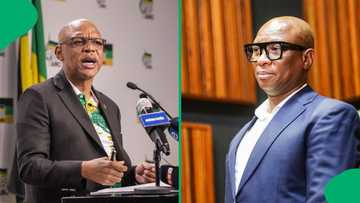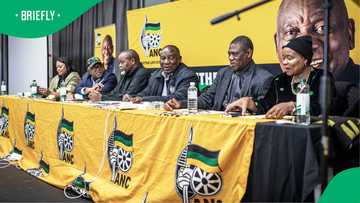“Get Rid of the ANC”: Economist on the Fence About SA’s Future Ahead of Mid Term Budget Speech
- South Africa's mid-term budget speech will focus on fiscal matters and public debt, among others, as the country navigates a tough economic situation
- The mini-budget is the first since the formation of the Government of National Unity (GNU), coming three months ahead of the national budget
- Finance Minister Enoch Godongwana will deliver the Medium-Term Budget Policy Statement (MTBPS) in Cape Town on Wednesday, 30 October 2024
- Efficient Group Chief Economist Dawie Roodt spoke exclusively to Briefly News about his hopes and expectations from Godongwana's address
PAY ATTENTION: Got a Minute? Complete Our Quick Survey About Briefly News!

Source: UGC
JOHANNESBURG — Finance Minister Enoch Godongwana is expected to harp on key areas of South Africa's economy when his mini-budget speech takes centre stage on Wednesday, 30 October 2024.
According to some experts, the Medium-Term Budget Policy Statement (MTBPS) address at Parliament's Nieuwmeester marquee in Cape Town will force Godongwana to "respond to some issues while avoiding others."

Read also
ANC's 2024 general election performance could be behind Zizi Kodwa, Pule Mabe arrests: analyst
Economist calls on getting rid of ANC
"There are some expenditure-related issues that he will not address as they relate to local authorities and state-owned enterprises," said Efficient Group chief economist Dawie Roodt, speaking exclusively to Briefly News.
PAY ATTENTION: Briefly News Needs Your Help! Take our Survey Now and See Improvements at Briefly.co.za Tomorrow
"However, there'll be others that he's forced to address, such as the public service wage bill, an important issue he must address. The rest? He might try to kick the can down the road."
The address will be the National Unity Government's (GNU) first mini-budget since the broad-based co-governing agreement was formed over 100 days ago.
During this time, the GNU has made its share of promises to improve the fiscal framework, root out corruption, and strengthen investor confidence.
Roodt did not mince his words when asked whether he was optimistic about a satisfactory improvement in the country's immediate economic outlook.
"I'm a little less pessimistic than I used to be because there is so much that needs fixing, and I don't think this government is capable of doing that. So, I'm more optimistic about the medium-term, but we need to eliminate the ANC, or at least the bad parts of the ANC.
"The economy is likely to react positively to the coalitition government but not by much. And not by much because we still have the dominant ANC party with its destructive ideologies and policies.
"So, we might go on like this for the next five years, with not much improvement. The real issues are political, which we need to fix [first] before we can talk about the country's economic future," he said.
Ahead of the important address, coming three months before the national budget, SA's economic future under the GNU has come into sharp focus.
Roodt, who said the rand's performance against the dollar was where it was supposed to be, and maybe stronger, assessed the current government's impact and detailed his expectations about Godongwana's address.
In addition to fiscal matters, the budget typically focuses on social welfare, public debt, and strategies for economic growth recovery.
Concerns and hopes from MTBPS
The MTBPS addresses the government's plans to navigate these challenges by shedding light on spending estimates for the first half of the current fiscal year and adjustments to the proposed estimates for the second half.
However, Godongwana is expected to outline the country's policy goals and macroeconomic forecasts for the next three years while unbundling revenue and spending estimates.
Roodt said he expected the minister to concede to an ailing economy caused by the wrong policies, while he criticised the other GNU members for not putting significant budgetary pressure on the African National Congress (ANC).
"He should say that the budget's revenue side is not doing well because the economy is not performing due to the policies.
"However, the silver lining is the two-pot system, which will boost the economy by a couple of million rands, but not much," he said.
Although expenditures aligned with estimates, Roodt expressed concern about monetary issues caused by public sector wage demands.
Notably, thousands of protesting South African Municipal Workers Union (SAMWU) workers brought parts of the Johannesburg Central Business District (CBD) to a standstill on 22 August, demanding an above 10% wage hike.

Read also
ANC's reputation damaged by corruption and failure to act, NEC report finds, South Africans agree
This was in contrast to the promised 3% tabled offer at the time, after South Africa's inflation reached 7.5% in September, down from a peak of 7.8% in July.
"Civil servants are demanding ridiculous increases and, once again, it seems the government will give in by giving them above-inflation adjustments," said Roodt.
"This is a bad thing because they're mostly overpaid and underworked. We've got highly paid, unproductive civil servants in South Africa, and we simply can't afford it anymore.
"Also concerning is the state's increasing debt, which will boost the interest payment on the debt, and, generally speaking, the state-owned enterprises which keep asking for bailouts.
"The most important question for the Finance Minister will be what he expects it to be, which will determine whether he confronts all of these things. I expect him to shoot for a number below 1% or [slightly] above."
With some luck, Roodt said the speech could see Godongwana highlighting new inflation targets, which he hoped would err towards a reduction of 3% to 4%.
He also said there might be a reference to the National Health Insurance (NHI) and basic income grants, though he didn't expect significant announcements.
PAY ATTENTION: Follow Briefly News on Twitter and never miss the hottest topics! Find us at @brieflyza!
Source: Briefly News




